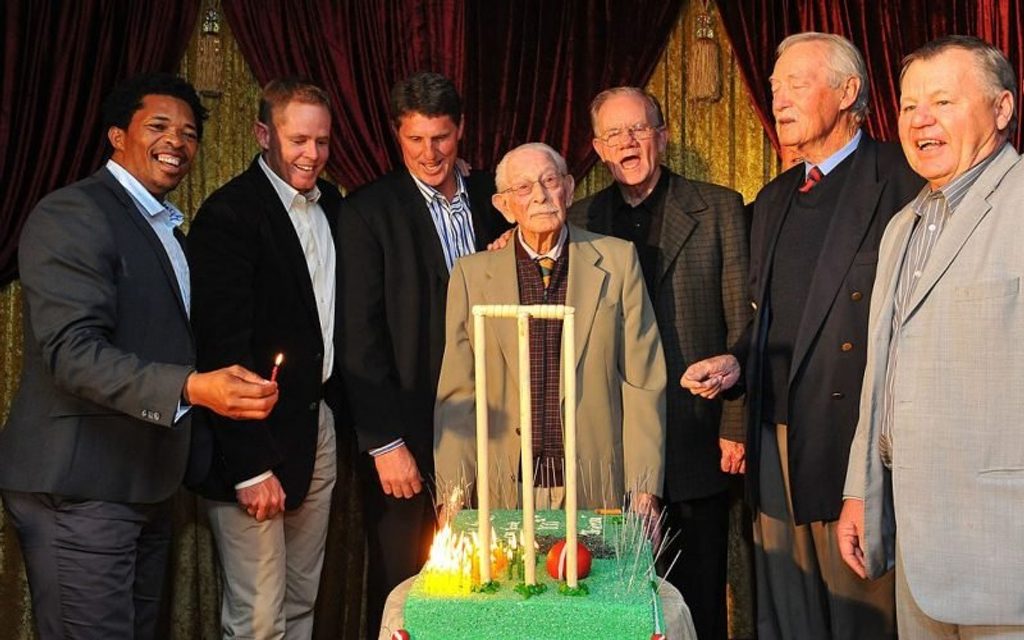
South Africa seamer Norman Gordon had a brief Test career, but he left his mark as the first men’s international cricketer to reach three figures in years.
Gordon, Norman, died on September 2, 2014, aged 103
The fan club of Norman Gordon’s bowling included at least two illustrious members. Wally Hammond described him as “a really reliable fast right-hander, always attacking and very difficult indeed to knock on to the defensive”. And Len Hutton was sure Gordon “would have made a big name for himself had he toured England”.
He might well have built on his success for South Africa in 1938/39 against England. But by 1947, and South Africa’s tour of England, he was 35 – and left out. In the end, his longevity made the greatest mark on the game: he was the first male Test cricketer to turn 100.
His first inspiration had come from watching Jack Gregory and Ted McDonald bowling for Australia at the Old Wanderers in November 1921. At school in Johannesburg, Gordon was so in thrall to cricket that he deliberately failed his exams to ensure another year in the team.
He made his debut for Transvaal in 1933/34, and was the leading wicket-taker in the Currie Cup four seasons later, earning selection in 1938/39 for the first Test against England, at the Old Wanderers. Hammond was the first victim in his five for 103, and he dismissed him twice more (and Hutton three times) during the series.
When the teams arrived in Durban for the timeless final Test, others might have wilted at the prospect. But Gordon said: “I appeared to be fit all the time, and I never got tired. If Alan Melville asked me to bowl, then I would bowl. I didn’t mind, because I just loved bowling.”
 Norman Gordon’s 100th birthday celebrations at the Longroom, Wanderers Stadium, Johannesburg on August 6, 2011. (Left-right) Makhaya Ntini, Shaun Pollock, Fanie de Villiers, Gordon, Peter Pollock, Neil Adcock and Mike Procter
Norman Gordon’s 100th birthday celebrations at the Longroom, Wanderers Stadium, Johannesburg on August 6, 2011. (Left-right) Makhaya Ntini, Shaun Pollock, Fanie de Villiers, Gordon, Peter Pollock, Neil Adcock and Mike Procter
By the time the Test reached its tenth day, Gordon was still running in, and was two balls into his 93rd eight-ball over of the match when rain fell just before tea. With five wickets in hand, England were only 42 short of a target of 696, but needed to catch the 8.05 train from Durban to Cape Town that evening to make the boat home. The game was abandoned.
Despite match figures of one for 256, Gordon – known as “Mobil”, because of the oil he used on his unruly hair – was the leading wicket-taker in the series, with 20 at 40. He was not tall, but he was strong, and bowled at a brisk pace with impressive late movement. His non-selection in 1947 appeared to be a matter of age and form, but he sometimes wondered whether being Jewish might have been a factor. When he ran in on Test debut, Gordon heard a spectator call: “Here comes the rabbi.”
Years later, one of the selectors told him they were concerned he might encounter anti-Semitism in England. He made his final first-class appearance against MCC in 1948/49, but retained a close interest in cricket. “I couldn’t believe, when the game went professional, that you could play cricket and get paid for it,” he reflected. “I would have done it for free.”








